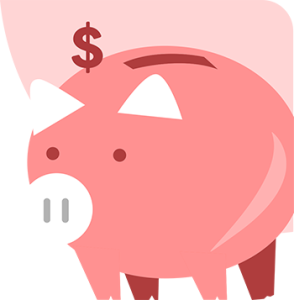5 tips for setting your prices as a startup entrepreneur

Our country has more and more people working for themselves. Maybe you too! Or maybe you have plans to start your own business. But how do you do it financially, what is involved on the money front and how can you tackle tricky issues – such as pricing? Marissa from The Money Mate is here to help! Read her blog for ELFIN here: 5 tips for setting your prices as a startup.
Psst: Did you know she is coming Nov. 19 to host a master class for ELFINNERS? Become an ELFIN member too and learn all about the financial aspect involved in entrepreneurship from Marissa.
5 tips for setting your prices as a startup entrepreneur
As a start-up business owner, it can be quite difficult to determine what prices to charge for your service or product. Aren’t you too expensive or too cheap? Doesn’t this scare people? How is it that company X makes so much revenue and how do I do the same?
When starting your business, these questions pop up in almost everyone’s mind. In this blog, I will take you through 5 tips that will help you set your price as an entrepreneur.
1 What does your selling price consist of?
We start with the basics. For this, we are going to write out what costs, revenue goals and profit goals you have. There is a difference between product entrepreneurs and service entrepreneurs; I discuss this briefly separately. Ultimately, you include all costs in determining your price.
Pricing for product entrepreneurs
Write down all the costs you have for the entire process in your business. What are your procurement costs, your materials and what are the costs for labels and packaging materials? In the case of a homemade product, how much time did you spend making the product?
Pricing for service entrepreneurs
In service businesses, it is important to keep track of how much time you put into something. For example, if you’re a coach, then you not only count the time of the calls but also the pre-work, processing and how accessible you are in between. Or you organize live days for which you rent a venue and catering. Other example: you are a photographer and you have to moadboard with the client and prepare the shoot in addition to the shoot. So you count these hours as well.
2 How do you feel about this award?
How do you feel about the price you set? Can you express this without shame and confidently? You can, of course, practice this in front of the mirror or with someone you know well. Of course, it may take some getting used to, but try repeating your chosen price several times.
To the extent possible, try to work with packages, rather than individual hours. This makes you sell much more the result or transformation to a client. Also, you don’t have to go back to sales after each session for another session.
3 Set prices from your goals
And no, not the standard “I want to make 10K a month. Of course, if this is really a goal, then you should definitely go after it. But many entrepreneurs primarily want to earn enough to live comfortably and with security, that often does not require 10K.
Suppose you are going to start in business and you need 2000 euros net from your business, this is the salary you want to pay yourself. From there, you calculate how much tax you will have to pay, how much you want to save for a buffer, how many expenses you expect to have and what you would like to invest in. Then you come to your revenue goal, which you are going to divide by the numbers you sell and the corresponding prices. This way you can see if the prices you want to charge are right for your goals. You can also assess whether you will build a profitable business this way.
4 You are a starter but not a beginner
Maybe you are just starting out as an entrepreneur but already have a lot of salaried experience in the same field of work. Then you don’t have to start at the very bottom but can factor that experience into your pricing.
5 The prices you set are not forever
Suppose you started with a lower price because you felt comfortable with it or because you wanted to practice. Does this mean you are now stuck with this for a very long time? Definitely not! Schedule monthly or quarterly review moments to reflect on whether your prices are still accurate. You can include the following questions:
- What value are you delivering?
- Do you have good reviews?
- How exclusive is your product?
- Has your cost increased?
- Have you worked for big names?
- What is your range?
- How much service do you provide? Are you also available in between?
- What do you feel good about? What do you dare to ask?
Do you still find prices “a thingy”?
Many business owners are always left struggling with their prices. Also see it as something that can constantly change, rather than something that is fixed. It’s helpful to be a little judicious about this, though, to avoid crooked faces from old/current customers. Should you still find it very difficult, consider the following:
- How many customers have you lost in the past due to price? Who are those customers and are they 100% your ideal customer?
- What is the customer’s main reason for doing business with you? Make a row out of that. Where is the price in that order?
- Are you giving your customers enough reasons to choose you based on other criteria instead of price?
Is a higher price always better? No, definitely not. You can increase your sales by raising your price or by selling larger quantities. But don’t stare blindly at this, this also often involves more costs. So I always say: get clarity in your numbers, only by knowing exactly what the numbers are in your business can you build a fundamentally strong business and start to grow.





